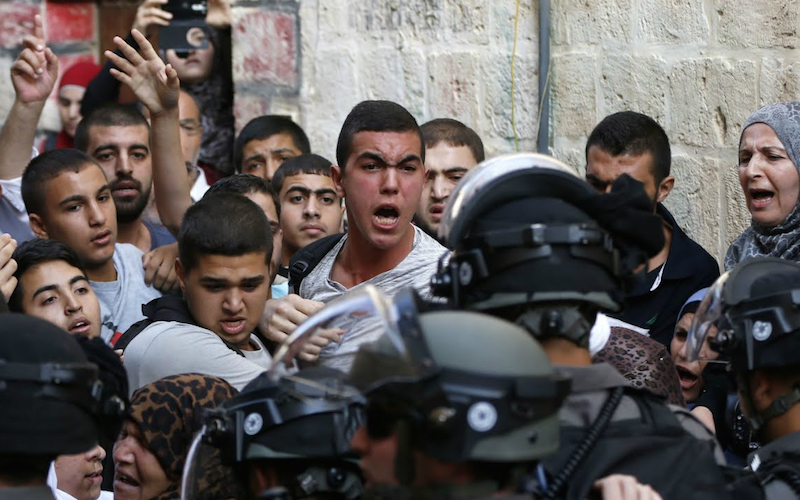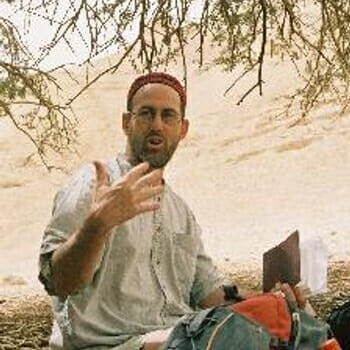
Israelis and Palestinians: Arab Lives Matter, Jewish Lives Matter
Not long ago my wife and I attended a concert which featured the music of the folksinger and political activist Pete Seeger. A palpable magic transcended and unified the audience in the room, echoing the words and message of Seeger. During Seeger’s career the words on his banjo were, “This Machine Surrounds Hate and Forces It to Surrender.” The challenge we face is that the forces and voices of violence, hate, and division are much better at knowing how to be heard. The song of peace, goodwill, and cooperation must be sung much louder. This is true of many conflicts in the world. It is certainly true of the Arab-Israeli conflict, and particularly now during this recent wave of violence we are witnessing.
Those voices of discord are not afraid to murder. They kill kings (Jordanian King Abdullah I), and presidents (Sadat), and prime ministers (Rabin), and U.S. presidential candidates (Robert F. Kennedy was killed for his support of Israel). And as we know they don’t stop there. Civilians, Palestinians and Israelis are their favorite murdered targets. Those killings not only perpetuate the conflict, but they have another result; they intimidate those who favor the two state solution. The slow evaporation of support for that resolution of the conflict shows the power of that force. More and more we see civil society intimidated and attacked in this conflict.
Violence is not the only tactic used. Palestinians deny the historical connection of the Jewish people to the Temple Mount, while at the same time Israelis dismiss Palestinian claims to the land. Both actions threaten and take away the identity and dignity of Israelis and Palestinians. The response of each is to feel vulnerable as core identities are perceived to be imperiled and jeopardized. In such a state there is a circling of the wagons with no sense there is anyone reasonable on the other side to talk with.
Related, Prime Minister Netanyahu and President Abbas have become masters of sleight of hand diplomacy. On the one hand they both say they are for a two state solution. But at the same time, with the other hand, their actions and words create the conditions so the other side feels they have no real partner for peace.
The Prime Minister’s policies of continued building on the West Bank, combined with the daily humiliating and frustrating encounters Palestinians are forced to put up with in a life under occupation, and deadly force the IDF uses in too many encounters with Palestinians, sends a clear message to Palestinians that the Prime Minister’s words in support of a two state solution are meaningless. President Abbas continued inflaming passions around the Temple Mount without clearly acknowledging Jewish claims, combined with a celebration of “martyrs” and payments to their families, as well as an endless culture of hate and incitement within Palestinian institutions, such as the claim by Abbas that a Palestinian teenager had been executed by the Israelis only to be seen alive in an Israeli hospital, is seen by Israelis as a showing of the true colors of Abbas.
The Bible begins with God creating the world by words. It conveys the extremely important message that words create worlds, realities, and conditions. That lesson has been lost by both sides and the violence we see today is a direct result of the abuse of the power of words.
The longer this conflict goes on it becomes easier for radical elements to become strengthened and increase in numbers, while at the same time it allows for a spiral downward drawing the two sides further apart. The present violence is but another reminder that the status quo cannot hold, and greater violence and loss of life will become the only path both sides will be condemned to. In its own way a closed loop of hate, lies, and violence has been created that is a self-fulfilling prophecy to nowhere. Such a dynamic allows both sides to convince themselves that they are correct and justified in their actions. A black and white approach closes off all other possibilities.
With those glasses on Netanyahu sees all Palestinians as supporting the destruction of the State of Israel. With such limited vision he refuses to differentiate between Hamas, Islamic Jihad, Abbas, stone throwers, peaceful demonstrators, everyday Palestinians, and Palestinians who work with Israeli-Palestinian People2People organizations. Yes, there are Palestinians who want to see Israel annihilated. For many Palestinians they are frustrated and angry at the stifling occupation that appears to have no end in sight. Netanyahu is unable to see that for the vast majority of Palestinians they simply want the occupation to end, just like Jews wanted the Greek and Roman occupations to end two thousand plus years ago; occupations Jews violently fought against and that are celebrated to this day. The longer there is no political solution both sides will birth greater violent radicalization. Too often we are told that this conflict needs to be left to the younger generation to solve it. The problem with that assumption is that we know there is less and less buy in by younger Palestinians and Israelis. Their hearts have been hardened by only knowing conflict with the other. Most of the present violence is perpetrated by individuals in their twenties and teens.
After over a 100 years this conflict is still defined by its original clash of two narratives. For Israelis, the Zionist endeavor is a homecoming after 2,000 years of exile. In their understanding they were able to find ways to hold onto a national identity, via a portable religion, that was desperately reborn by the dark realities of 19th century European anti-Jewish pogroms and persecution culminating in the Shoah, the holocaust the following century. The ideas of 19th century European nationalisms also influenced Arab nationalism, and by extension Palestinian nationalism, also played a role in the formation of Zionism. For Palestinians, Zionism is not a homecoming but an invasion. In their eyes it is the latest expression of European imperialism beginning with Napoleon in 1799 who called for the establishment of a Jewish protectorate in Palestine under French rule and then carried further by the British in the 19th century. Lord Shaftesbury called for the return of Jews to Palestine in 1840 and others followed advocating the idea as the century rolled on culminating in the Balfour Declaration of 1917.
At the end of the day this conflict comes down to these two radically different core perceptions of what is going on. It cannot be emphasized enough how it influences both sides in their statements and actions, including those of Abbas and Netanyahu discussed above. It shades everything. In 1954 Edward Morrow insightfully said about the conflict in a speech when he received the Freedom House Award, “It is an emotion-packed controversy, and there is no room for reason in it.” Today, over sixty years later we see how prophetic his word have been. These narratives speak to the core identity of both peoples and when those identities are challenged and attacked rational thinking goes to the wayside and short term thinking rules the day as fear becomes the driving force. Like a drug addict or an alcoholic, and there are addictive pathological behaviors to this conflict, the immediate fix becomes the compass.
As he worked to rally the nation President Franklin D. Roosevelt addressed, in his first inaugural address, the paralyzing effect fear has when he declared, “the only thing we have to fear is fear itself.” There are real fears that both sides feel a need to be addressed, but when it drowns out all other possibilities such an approach is both very limiting and debilitating. What is needed is more long term and proactive thinking. In a classic tail wagging the dog syndrome the radical elements on both sides have been able, with growing strength, to control this conflict. Real leadership is able to rise above that force and guide a people, a nation, on a different path.
That different path must include an acknowledgment by each side of the importance of their respective narratives to the other. The Israelis need to understand how their endeavor can legitimately be seen by Palestinians as an invasion, while at the same time Palestinians need to understand that Zionism is based on an authentic historic connection the Jewish people have to land. Such an acknowledgement by the Israelis will not lesson the validity of their cause, and such a recognition by the Palestinians will not take away from their national aspirations. Rather, such mutual acknowledgements can open doors to new perceptions and opportunities. This conflict will not end when both sides agree on everything, rather the challenge is for both sides to learn to acknowledge profound differences while at the same time find a different way to go forward. The important work of the scores of Israeli and Palestinian People to People (P2P) organizations within the Alliance for Middle East Peace (ALLMEP) such as the Arava Institute for Environmental Studies, the Parents Circle, PeacePlayers, the Search for Common Ground, the Jerusalem YMCA, Kids4Peace and others remind us of this possibility. In some ways these organizations are the only players left standing who can remind both sides of a different approach. Secretary of State Kerry and his Middle East Peace team must utilize these organizations; they are peace assets on the ground.
Underlying all of this is the misaligned orientation that says that this is a conflict between two nationalisms. While that may be true historically, and God save us if we allow this conflict to morph into a religious conflict, by saying it is a conflict of two nationalisms we say there are equal needs that need to be met. The difference is that for Palestinians to agree to that formula they have to give up some of their land, while on the other side of the equation the Israelis gain something they did not have at the beginning of this conflict. Being sensitive to that dynamic is essential to understand, in part, why this conflict has been stuck for so long. But with that understanding, acknowledgement, and sensitivity a new door may be opened to allow both parties to find a way to go forward.
That is the choice. Remain stuck with that which is familiar and known, but has failed and will lead to only more death, violence, and despair or set out on a new path. Pete Seeger took the words from Ecclesiastes and put them to music in his iconic song, “Turn! Turn! Turn! (To Everything There Is a Season).” For too long this conflict has created the time to kill, to mourn, to throw stones, and of war. But as Ecclesiastes and Seeger remind us these can also be a time to heal, to dance, to embrace, and create the conditions for peace. That will only happen if the voices of that song join together and sing louder and louder, and when Israelis and Palestinians both embrace in the most profound way that Arab lives matter and Jewish lives matter.

